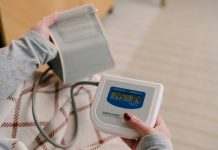
High blood pressure, or hypertension, is a health condition that affects a significant portion of the adult population worldwide.
It’s a major risk factor for heart disease and stroke, but the good news is that it can often be managed without medication, especially in its early stages.
Lifestyle changes can be incredibly effective in controlling high blood pressure. Let’s explore some of the most effective natural strategies that have been backed by research.
First and foremost, diet plays a crucial role in blood pressure management. The DASH diet (Dietary Approaches to Stop Hypertension) is specifically designed to help lower blood pressure.
It emphasizes fruits, vegetables, whole grains, and lean proteins while reducing the intake of fats, red meat, and sweets. Studies have shown that following the DASH diet can significantly reduce blood pressure in just a few weeks.
Salt intake is another critical factor. Salt, or specifically the sodium in salt, can cause the body to retain water, which raises blood pressure. Reducing salt intake to less than one teaspoon (6 grams) per day can improve heart health and lower pressure.
Reading food labels, eating less processed food, and using herbs and spices instead of salt for flavoring can help significantly reduce sodium intake.
Increasing physical activity is another effective strategy. Regular exercise helps make the heart stronger and more efficient at pumping blood, which lowers the pressure in the arteries.
The American Heart Association recommends 150 minutes of moderate-intensity aerobic exercise, like brisk walking or cycling, per week. This can include activities like taking a daily walk, using the stairs instead of the elevator, or engaging in sports.
Weight management is also crucial. Blood pressure often increases as weight increases. Losing even a small amount of weight if you’re overweight or obese can help reduce your blood pressure. Regular physical activity and dietary changes can contribute to effective weight loss.
Limiting alcohol intake can also impact blood pressure. While you might have heard that moderate alcohol consumption can lower your risk of heart disease, too much alcohol can raise blood pressure dramatically.
It’s recommended that men limit their intake to two drinks per day and women to one.
Stress is another factor that can affect blood pressure. Chronic stress may contribute to high blood pressure, especially if it leads to poor habits like unhealthy eating or drinking.
Techniques such as deep breathing, meditation, and practicing mindfulness can help reduce stress and thus blood pressure.
Additionally, getting good sleep is essential. People who sleep less than six hours a night might have a higher risk of developing hypertension.
Practicing good sleep hygiene, such as having a consistent bedtime routine, making your bedroom comfortable and free of distractions, and avoiding caffeine before bed can improve sleep quality.
Lastly, regular monitoring of your blood pressure is vital. Home monitoring can help you keep tabs on your blood pressure, make certain your lifestyle changes are working, and alert you and your doctor to potential health complications.
In conclusion, while medication can be essential for managing high blood pressure, especially in more severe cases, there are many effective natural strategies that can help control blood pressure.
By adopting a healthy diet, reducing salt intake, staying active, managing weight, limiting alcohol, reducing stress, and getting good sleep, many people can significantly reduce their blood pressure naturally.
Remember, these changes are not just for managing high blood pressure—they can also improve your overall health and quality of life.
If you care about blood pressure, please read studies about how diets could help lower high blood pressure, and 3 grams of omega-3s a day keep high blood pressure at bay.
For more information about blood pressure,, please see recent studies that beetroot juice could help reduce blood pressure, and results showing cinnamon could help lower high blood pressure.
Copyright © 2024 Knowridge Science Report. All rights reserved.



